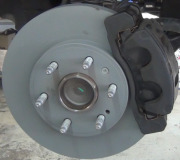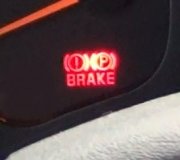The cause we dread finding is a blocked master cylinder. The clue here is when you loosen the steel lines at it, you'll get a little spurt of fluid, then the brakes will release. If this happens right after another repair in that area, typically the power booster or the brake light switch was replaced, we'd expect to see something holding the brake pedal down too far. The switch could be over-adjusted or the push rod coming out of the booster is adjusted too long. Most push rods on domestic cars aren't adjustable. This is more of an import thing.
When nothing was done that affects the brake pedal, the next thing we look for is brake fluid contaminated with a petroleum product. The rubber compound used with brake fluid is destroyed by engine oil, power steering fluid, transmission fluid, and axle grease. Professionals even wash their hands with soap and water before handling rubber brake parts to avoid getting fingerprint grease on them.
When a petroleum product enters the brake fluid, it causes rubber parts to swell and become mushy. The first visual clue is the rubber bladder seal under the reservoir cap is blown up and mushy, and can't be poked back into the cap. The same thing happens to the rubber lip seals in the master cylinder. They grow past the fluid return ports and keep the brake fluid trapped. As the fluid warms up and expands, since it is trapped, it applies the brakes harder and harder. That trapped fluid can be released by opening the hydraulic system anywhere, including the lines right up by the master cylinder.
The only proper repair for contaminated brake fluid is to remove every part that has a rubber part that contacts the fluid, flush and dry the steel lines, then install all new parts. If any part is not replaced, the contamination will leach out of the rubber part and recontaminate the new fluid and parts. This includes calipers, wheel cylinders, rubber flex hoses, master cylinder, reservoir cap, and combination valve. When the car has anti-lock brakes, the repair includes the hydraulic controller. Trucks and minivans usually use a rear height-sensing proportioning valve. Those have rubber seals and o-rings, so it must also be replaced. The cost of this repair often is more than the value of the vehicle.
The good news is when the brakes do not release when loosening the lines at the master cylinder. That means the fluid is being trapped somewhere else, and the cause is most likely not due to fluid contamination. This could be caused by the ABS hydraulic controller, but we don't hear about that very often. You'd find this the same way by loosening the steel lines leaving it that go to the wheels.
Monday, April 5th, 2021 AT 12:21 PM




